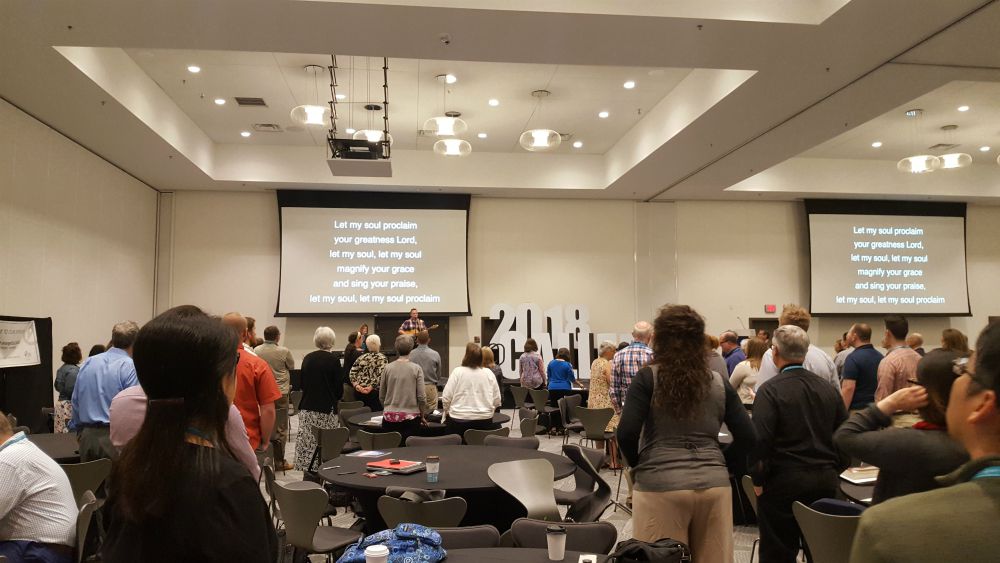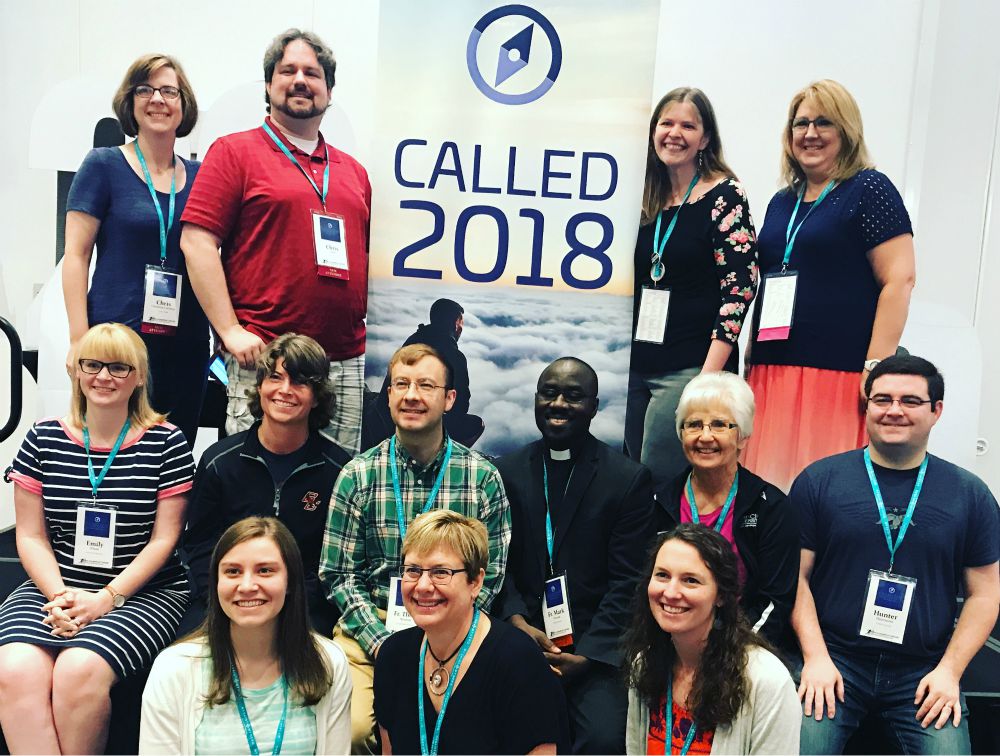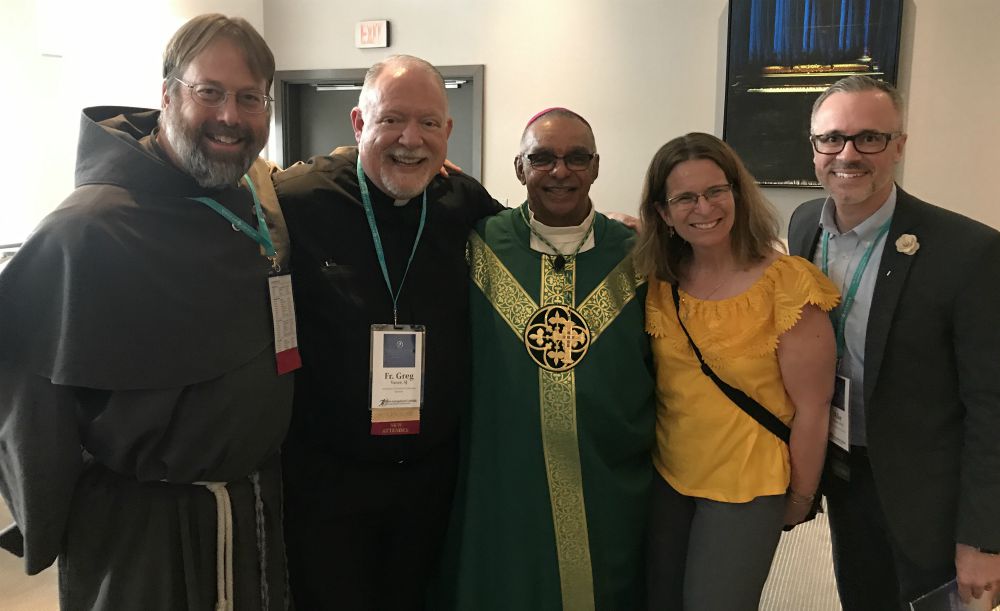
About 300 people who work in campus ministry attended the "Called: That Your Joy Be Complete" conference May 29-June 1. (Heidi Schlumpf)
Although Lisa Lytwyn has worked in campus ministry for almost a decade, she had never attended a national convention of the Catholic Campus Ministry Association before.
But an emphasis on the "new evangelization" at this year's gathering motivated her to trek to the Minneapolis area May 29-June 1 to network with 300 others who work in campus ministry. The theme for the conference — the organization's first after a hiatus of five years — was "Called: That Your Joy Be Complete."
"It has been wonderful to be with other campus ministers and see that there's a lot of us interested in evangelization," said Lytwyn, coordinator of campus ministry at the Catholic Student Center at the University of Maryland in College Park.
Among the attractions for Lytwyn was keynote speaker Sherry Weddell, a leader in the new evangelization movement, which emphasizes a personal relationship with Jesus and tends to attract more traditionalist Catholics.
In an address titled "God Has No Grandchildren," Weddell explained that faith — including Catholicism — is no longer inherited, so church institutions must evangelize the one third of young Americans who don't believe in God and don't even have memories of religious practice.
"We're living in 'mission-dom' now, no longer Christendom," she said to an audience feverishly taking notes. "The rules are different. All institutions must be missionary now."
Weddell urged the campus ministers to shepherd young people into "apostleship" or "spiritual adulthood," which she estimates only 2 percent of baptized Catholics reach. Apostleship builds on personal conversion that then inspires "missionary disciples" to try to bring others to a similar conversion.
"If we don't have disciples and apostles, we might as well close up shop," said Weddell, the cofounder of the Catherine of Siena Institute and author of Forming Intentional Disciples.

Campus ministers from the state of Iowa pose at the 2018 Catholic Campus Ministry Association convention (Courtesy of Catholic Campus Ministry Association)
Convention concerns
But Weddell's message didn't resonate with everyone in the room. While challenged by the call to think more explicitly about how students can be transformed through a relationship with Jesus, Crystal Sullivan had some concerns.
"I recognize that ways of being holy and living as a disciple might look a little different for different people, but I would want to make sure this model is not too narrowly focused," said Sullivan, executive director of campus ministry at the University of Dayton in Ohio.
Lytwyn's and Sullivan's schools represent two different models of campus ministry. The University of Maryland — and other state and some private schools — serve only Catholic students at a Newman or other Catholic center, while the University of Dayton — and other Catholic colleges and universities — usually have a mission to serve all students, and thus are broader in their outreach.
Catholic schools may have more staff and resources for campus ministry, so state schools are more likely to partner with outside, para-church organizations, such as Fellowship Of Catholic University Students (FOCUS), St. Paul's Outreach or Evangelical Catholic.
Data from a survey conducted by the U.S. Conference of Catholic Bishops reveals different priorities and practices among campus ministers from the two models of ministry.
The two models are "distinctive but also complementary," said Barbara H. McCrabb, assistant director for higher education for the U.S. bishops Secretariat of Catholic Education, in presenting some of the survey results at the convention.
"There are many different ways of bearing witness," she said. "If we minister in only one way, we will miss a portion of our campuses."
The Catholic Campus Ministry Association is trying to serve campus ministers from both models, as well as the outside groups, several of which were sponsors of the conference and helped get the association back on its feet after some financial difficulties.
"We don't favor one or the other. I see the beauty and value of both," said Michael St. Pierre, Catholic Campus Ministry Association's executive director, who told NCR he is trying to keep the organization as an umbrella for the more than 2,000 people who work in campus ministry in the U.S.
Advertisement
Association rebranded
But five years ago, Catholic Campus Ministry Association was losing members and facing financial challenges, in part because many dioceses cut campus ministry budgets after the recession and sex abuse scandals. The organization's staff of seven was whittled down to one, St. Pierre said.
After much soul searching, the association's board created a "director's circle" to solicit donations to rebrand the organization and give a seat at the table to the para-church organizations.
Organizations such as FOCUS, as well as dioceses and individuals, contributed financially to the reboot of Catholic Campus Ministry Association, said Michael School, director of the Office for Evangelization for the Diocese of Richmond, Virginia, and a member of the association's director's circle.
"Now there are more players, more diverse representation," said School. "We've broadened the diversity of what CCMA has to offer."
Today the organization has 700 members and offers a variety of services, including a podcast, webinars and trainings.

From left: Conventual Franciscan Friar John Bahmann; Jesuit Fr. Greg Vance, Bishop Fernand Cheri; Rosie Shawver; and Michael St. Pierre, CCMA executive director (Courtesy of Catholic Campus Ministry Association) *This cutline has been updated.
"We want to support today's campus minister," St. Pierre said. "That's not meant as any disrespect to the past. What college students are experiencing today is very different. And today's campus minister ministers differently."
The addition of outside, para-church organizations is "the new normal," said St. Pierre. Such groups grew as dioceses cut campus ministry budgets and traditional campus ministers lost their voice, he said.
What he calls "the evangelical voice" has had a "huge impact," said St. Pierre, who sees it as "a Gospel voice." Yet he admits that some view it "very narrow or a little bit Protestant."
Balancing act
St. Pierre said he is not an ideologue and is trying to walk a tightrope to keep all Catholic Campus Ministry Association members happy, while also educating the U.S. bishops about the importance of campus ministry.
"The thing is that we're not reaching the majority of Catholic students on any campus," he said, and certainly not reaching any students on the three-quarters of four-year institutions with no Catholic campus ministry presence.
"This is really cliché, but I do believe that together we can do even more," he said. "But we can't do it alone. We need each other. "
The current executive board includes a representative from FOCUS and St. Paul's Outreach, as well as campus ministers from four state schools — but no member from a Catholic university. St. Pierre said he plans to add a representative from a Catholic school in the next two years.

Leadership expert and best-selling Catholic author Patrick Lencioni provided the keynote address, "The Ideal Team Player and how it Relates to Campus Ministry" at the convention. (Courtesy of Catholic Campus Ministry Association)
Catholic schools were well represented at the convention's awards ceremony. The three honorees were St. Edward's University in Austin, Texas, for service; to St. John's University in New York for discipleship and Virginia Tech/St. Paul's Outreach for evangelization.
Still, some attendees said they felt the convention emphasized Catholic evangelization so much that it did not address other issues affecting campus ministry and higher education, such as technology, budgets or students' mental health issues.
"It seems focused on our Catholic bubble, rather than addressing Catholic identity in a pluralistic society," said Julianne Wallace, director of campus ministry at Alvernia University in Reading, Pennsylvania, a Catholic school.
Tension about the role of service or justice work in campus ministry also arose at the convention, with some seeing it as a valid expression of faith and an "on-ramp" to bring students into campus ministry, while others insist service flows out of a relationship with Jesus Christ, which must come first.
One of the few Catholic campus ministers working at a community college, James Gentile, was enthusiastic about this, his first, Catholic Campus Ministry Association convention. "It's been good for me to meet other ministers here and learn about some of the advantages and challenges they face," said Gentile, an English professor and adviser to the Newman Club at Manchester Community College in Connecticut.
Rosie C. Shawver, director of campus ministry at the University of Southern California in Los Angeles and an association board member, believes there is room for all who do campus ministry in the organization. "I think we can help and grow with one another," she said.
[Heidi Schlumpf is NCR national correspondent. Her email address is hschlumpf@ncronline.org. Follow her on Twitter @HeidiSchlumpf.]








